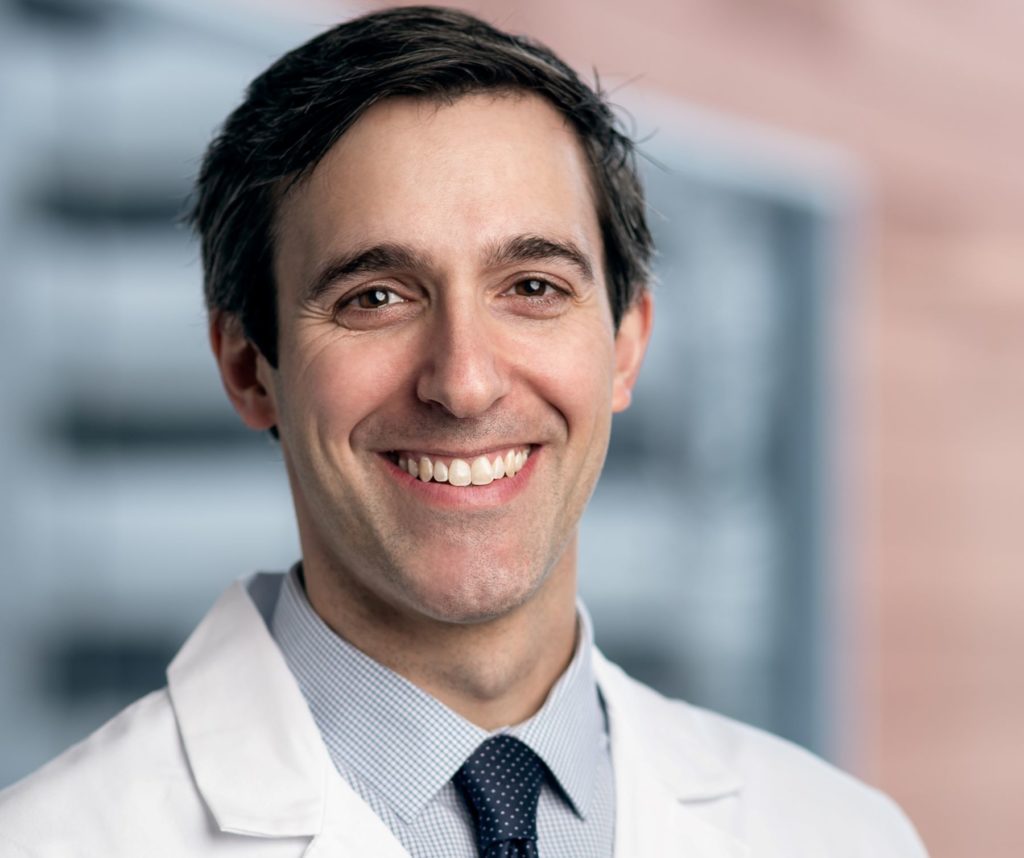
About this series: Lighting the Way With … is a periodic series in which we shine a light on Lawrence University alumni. Today we catch up with Dr. Ben Weston ’05, an associate professor of emergency medicine at Medical College of Wisconsin who has been a leader in the Milwaukee area in the COVID-19 pandemic battle.
Story by Ed Berthiaume / Communications
When Dr. Ben Weston ’05 tells you “it’s been an interesting year,” know that is his understated way of saying it’s been an emotionally draining, frustrating, holy-cow-I-can’t-believe-that-just-happened, gut-wrenching, exhausting, pants-on-fire sort of a year.
So, yes, interesting.
The Lawrence University alumnus is among the army of front-line health care workers who have been living the COVID-19 pandemic up close and personal on a daily basis, and he’s done it wearing three important but vastly different hats.
For two shifts a week, Weston works as an emergency department physician at Froedtert Hospital in Milwaukee, part of his role as associate professor of emergency medicine at Medical College of Wisconsin. It’s here where he sees COVID patients fighting for their lives, where the latest surge threatens to overwhelm staff and space, where he and colleagues have to wear the same protective masks for multiple days for fear of resources running short.
He also lives it in his role as director of medical services for Milwaukee County, working through the Office of Emergency Management to coordinate 14 fire departments, ambulances, and other first responders in providing emergency medical care for a region with a population of nearly 1 million people.
For more Lawrence alumni features, see here.
And he lives it in his role as medical director of the Milwaukee area’s COVID-19 Unified Emergency Operations Center, working with the city of Milwaukee, the county, and a bevy of municipalities to coordinate responses to the pandemic and provide consistent messaging to residents.
Three hats, three perspectives of a pandemic that has shown no signs of abating, and a day-to-day schedule that has been dominated by the coronavirus since the earliest days of 2020.
And when Weston’s work day is over and he settles in with his wife and three young kids, can he move away from the brutal realities of the health care crisis? Well, not completely. His wife, Dr. Michelle Buelow, is a physician with Sixteenth Street Community Health Centers on the south side of Milwaukee, treating a heavily Hispanic population that has been hit hard by COVID-19.
“She’s been right in the thick of it as well,” Weston said. “So, the evenings usually start with a little pandemic conversation, and then we try purposely to shift to other things.”
Beyond the imaginable
Weston knew his world was about to change in January as the virus began its spread. What he didn’t know was that nearly a year later we would be staring into what could be a very dark winter as cases surge across the United States, hospitals are stretched to capacity and beyond, and the death toll nears 275,000.
“I don’t think anybody anticipated the longevity or the extreme impact that COVID would have,” Weston said of those early days before the virus landed in the U.S. “We would talk through scenarios about if long-term care facilities were hit or if there were outbreaks in regions of the community. I think it was certainly hard to imagine back then that we would be having this widespread outbreak everywhere like we have now. Every county in Wisconsin, every state in the United States, every country in the world is having these surges in cases right now, along with hospitalizations and deaths. We would have been naïve to think it wasn’t going to affect us at all, but I don’t think anyone anticipated this.”
Weston has been front and center in messaging to the public about the spread of the virus, the significance of the threat, and the need for personal responsibility. He’s spoken at news conferences and done dozens of interviews with media, locally and nationally. He’s done so while fighting conflicting messages coming from the national level.
“There have been a lot of novel aspects to the virus that makes it very challenging to control,” Weston said. “Biologic aspects of the virus, the incubation period, the asymptomatic spread. Things like that make it very hard to control, and difficult to message from a disease perspective. And then you compound that with messaging at the highest level and the national response that a lot of times is contradictory to the local response and the local messaging and you have a pretty difficult situation.”
There are consequences that come with that lack of a unified national response. One, of course, is the accelerated spread of the virus when segments of the population refuse to take it seriously, continuing to gather in confined spaces and refusing to wear masks. Another is the emotional toll it’s taking on health care workers. They not only face burnout because of the workload, but they also have to deal with backlash from people who see the pandemic as politics, Weston said.
“Everyone is really strained from a work standpoint,” he said. “Our public health infrastructure is not designed for this, nor is it funded, nor is it staffed in a way to manage something like this.”
To then receive hateful messages from someone taking exception to the daily news cycle adds to an already overwhelming burden, Weston said.
“It’s disheartening for public health practitioners when they are working these 60-, 70-, 80-, 100-hour weeks, and then at the end of the week when they feel like they’ve done something positive, they open up their email or listen to their voice mail and that’s what they hear.”
Through it all, though, there are opportunities to smile, Weston said. Health care workers need to cling to those moments. For him, it’s a kind email from a woman who opted to skip an indoor Thanksgiving gathering after hearing him speak on the dangers of such behavior. Or seeing multiple health care organizations across the state come together to share data and strategies, something that would have been unheard of a year ago.
“They come in somewhat small victories,” Weston said.
A path forged at Lawrence
Before Weston earned his medical and Master of Public Health degrees at the University of Wisconsin, he was a biology major at Lawrence. The classroom instruction prepared him well for medical school. But he points to campus experiences outside of the classroom that helped him develop the leadership and collaboration skills that are in play now. He worked his final three years at Lawrence in residence hall leadership positions, first in Plantz Hall and then in Hiett Hall, and chaired the Lawrence University Community Council’s Judicial Board.
“I loved my Lawrence experience,” Weston said. “I had the privilege of having leadership opportunities at Lawrence that I think helped to develop and hone my ability to be in these positions I’m in now.”
He cites then-Dean of Students Nancy Truesdell and current Dean of Students Curt Lauderdale as mentors who helped guide his journey.
“They were great mentors, and I saw great examples of principled leadership and steadfast collaboration from both of them that have certainly carried forward to my career,” Weston said. “Those were critical building blocks for me.”
Those lessons, he said, will be close at hand as the calendar flips to 2021 and he looks to help colleagues weather at least a few more months of distress before a vaccine hopefully brings some relief.
“It’s been hard the last few weeks to see the surges going up, knowing that no hospital can keep up with those sorts of numbers,” Weston said.
But the recent news of a vaccine that could be coming soon has buoyed spirits among health care workers, even though they know things will be difficult between now and spring.
“What changes is the perspective,” Weston said. “If we had talked back in July, August, September, we didn’t know when the end point was. We hoped it would be maybe in the spring, but we didn’t know. We had no evidence to point to, to say there’s an end to this, it’s coming. There was talk that this could go on for years.
“And now we see promising signs that there is an end point. We see the vaccine trials and we see this news and we start talking about how we’re going to distribute it. And I think that’s great news and we should celebrate it. But we also should recognize that the vaccination campaign isn’t going to take off and get everyone vaccinated this winter. We have to get through what’s going to be a really hard winter. So, the message has to be that we can celebrate the vaccine, but for the next few months we really need to buckle down. We have winter coming. It’s going to be a challenging time. But we know an end is in sight.”
Ed Berthiaume is director of public information at Lawrence University. Email: ed.c.berthiaume@lawrence.edu

Recent Comments